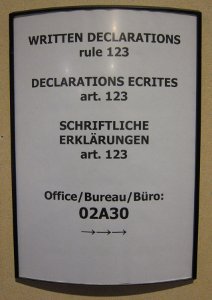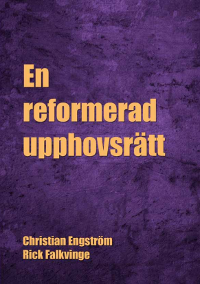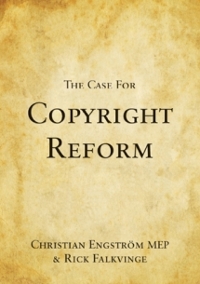
"Extend data retention to search engines, to protect the children!" EU parliamentarians demand in Written declaration 29
This is a translation of a blog post I published in Swedish on May 28, with most of the links changed to point at targets in English.
All Members of the European Parliament can right now sign a so called ”written declaration”, that demands that the Data Retention Directive be extended to cover search engines as well. They will then be forced to routinely save data about which information each of us citizens has been looking for on the net. The argument for the expanded surveillance is the fight against child pornography, as usual.
The proposal for collection of data about our Internet searches is known as Written declaration 29. The people behind the written declaration have a campaign site called smile29.eu.
I don’t know why they have chosen such a tasteless web address. Whether we are talking about sexual abuse of children or the introduction of mass surveillance, I don’t think it’s anything to smile about. But that’s a side track.
The core demand in Written declaration 29 is
2. Asks the Council and the Commission to implement Directive 2006/24/EC and extend it to search engines in order to tackle online child pornography and sex offending rapidly and effectively;
(Emphasis added)
If you follow the reference to Directive 2006/24/EC, an old acquaintance rears its ugly head: the Data Retention Directive.
According to the Data Retention Directive, which is currently in various stages of implementation in the different member states, Internet service providers and mobile network operators are required to collect and save data about who we are in contact with and where we are located. With Written declaration 29, search engines like Google and others will have to collect and save data about our searches, and make the data available to the police on demand.
Several Swedish bloggers have taken note of Written declaration 29, for example Xorbot, Sultan, Satmaran, and Göran Widham.
I agree with their criticism. This proposal adds another building brick to the surveillance society.
So what happens now?
A written declaration is one of the many instruments that the European Parliament has to express its views on a matter. The written declarations are slightly outside the normal work flow at the European Parliament. They are intended as a means for groups of individual MEPs (Members of the European Parliament) to take initiatives that are outside the current political agenda, often for the purpose of starting a debate.
For example, Written declaration 30 wants to limit the use of trans-fatty acids in food, and Written declaration 34 wants to make May 22 the European Day Against Obesity.
The authors of a written declaration first write a text that says what they think the European Parliament should express as its opinion. It has to be a short text of at most 200 words, and it should be structured like the examples, with first some references, then a fes paragraphs where the European Parliament expresses an opinion and proposes some actions.
The authors of Written declaration 29 are MEP Tiziano Motti from Italy, and MEP Anna Záborská from Slovakia. Both are members of the Christian Democrat group EPP, which is the biggest group in the parliament.
When the written declaration is submitted to the tabling office it is given a number, and is translated to all the official working languages. It is then kept avaialable for all Members of the European Parliament for 3 months, so that they can sign the declaration if they want to.
If a written declaration is successful in collecting signatures from a majority of the members within the stipulated time, it is adopted. Then whatever the decalation said becomes the official position of the European Parliament on the matter.
If the authors of a declaration fail to get enough colleagues to sign it within the time frame, the declaration falls and that is the end of it.
Since there are 736 members of the parliament (until the Lisbon Treaty extends that number), 369 signatures are required for a written declaration to pass.
On the overview page for written declarations you can see how many signatures each declaration has collected. Right now, Written declaration 29 has collected 324 signatures.
It is already dangerously close to being adopted.
When a written declaration is adopted, this in itself has no formal legal effect. All it says is that the European Parliament thinks this or that about a certain issue, and invites the European Commission to take this or that initiative to address the problem. It is then up to the Commission if it chooses to take any such initiatives, or if it prefers to just ignore it.
But even if an adopted written declaration has no direct legal effect, it is an important signal to the Commission. If there is somebody within the Commission who wants to do a certain thing, and a written declaration appears asking the Commission to do just that, it becomes considerably easier for the Commission to get going.
If Written declaration 29 about data retention for internet searches becomes reality, it will presumably be delivered to Swedish Commissioner Cecilia Malmström. She is responsible for the area of ”Fredom, Security, and Justice” (yes, it’s actually called that), and she has recently made a proposal for the introduction of censorship on the Internet with child pornography as the excuse.
If this declaration is adopted, Ms. Malmström will get more gasoline to pour on the flames. She can then point at the parliament explicitly asking her to introduce data retention on Internet searches, and continue her crusade under the child pornography banner against the free and open Internet.
…………
Andra bloggar om: piratpartiet, eu, politik, informationspolitik




 Christian Engström, former Member of the European Parliament 2009-2014 for Piratpartiet, Sweden
Christian Engström, former Member of the European Parliament 2009-2014 for Piratpartiet, Sweden



